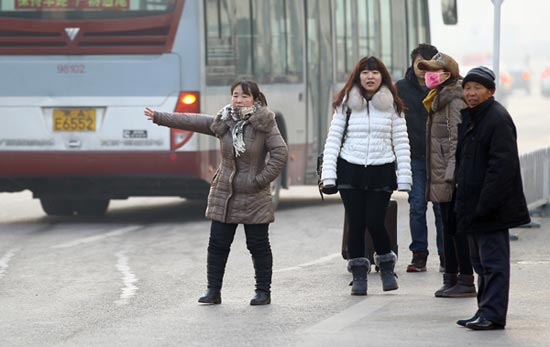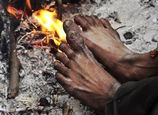
 |
| People wait for a taxi in the morning rush hour in Dongzhimen in downtown Beijing. (China Daily/Zou Hong) |
Change urged
Unlike Zhou and Wang, the 1,200 private taxi drivers don't have to worry about the costly franchise fee.
In Beijing's Shijingshan district, Mo Shilan, 46, started her career as a private cab driver when she obtained a taxi license 17 years ago. Like Zhou, Mo also starts work at 7 am but returns home at about 11:30 am to make lunch for her husband and child. After an hour's nap, she drives for another three hours in the afternoon. After returning home, her husband takes the wheel for a night shift. The self-reliant business has brought the family an apartment and a luxury car.
However, Mo only pays the traffic authority 800 yuan each month. "I will continue to be a private taxi driver, and so will my husband, because we don't have much pressure," she said.
Beijing ranks highest nationwide in number of taxis per person, with 31 cabs for every 10,000 people, but there is still a shortage of taxis, according to Wang Keqin, the researcher, who has investigated the taxi industry in more than 200 cities in the past 10 years.
Wang says the fundamental problem for China's taxi industry stems from the franchised system and price control by the government. "Like any other businesses, taxis should be cultivated in free competition to get better service."
Wang Jun, professor in law at China University of Political Science and Law, said the difficulty in finding a taxi is closely related to the city's transport system, and the problem won't be solved as long as there is heavy congestion during rush hours.
Mo Yuchuan, a law professor at Renmin University of China, said major cities should change the way people travel in town by increasing public transport efficiency through strengthening the development of subways and buses.
For now, with the taxi problem unresolved, a growing number of people seem destined to remain disgruntled, frustrated and in search of a cab at the roadside.


















 'Sister House' case urges efforts in combating corruption in affordable housing
'Sister House' case urges efforts in combating corruption in affordable housing


![]()
